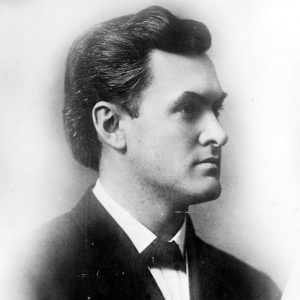calsfoundation@cals.org
Effiegene Locke Wingo (1883–1962)
In 1930, Effiegene Locke Wingo became the second of only four women from Arkansas to be elected to the U.S. House of Representatives, where she served from November 4, 1930, to March 3, 1933. Wingo introduced eighteen bills and served on three House committees during her congressional service.
Effiegene Locke, daughter of George T. Locke and Callie Blanche Dooley Locke, was born in Lockesburg (Sevier County) on April 13, 1883. She attended Union Female College in Oxford, Mississippi, but it is unknown if she graduated from this institution. In 1902, she graduated from Maddox Seminary in Little Rock (Pulaski County) with a bachelor’s degree in music. On October 15, 1902, she married Otis Theodore Wingo, a lawyer and banker who had moved from Tennessee to De Queen (Sevier County). The couple had two children, Janie Blanche Wingo and Otis T. Wingo Jr. The family lived in De Queen until 1912 when Otis Sr. was elected to the U.S. House of Representatives from Arkansas’s Fourth Congressional District.
After her husband’s death on October 21, 1930, Effiegene Wingo was chosen by special election to fulfill the rest of his term while simultaneously being elected to a full term in regular elections on the same day. It was the first time any state had more than one woman in Congress at the same time. (Pearl Oldfield was then serving the final session of her House term.)
The greatest challenge facing Congress when Effiegene Wingo took office was the Great Depression, but locally Arkansas and twenty-two other states were also concerned with a drought that began in the spring of 1930. This drought became Wingo’s major concern in the House. She worked to provide assistance to those in her district, both in her congressional voting and in actions at the local level. After funding from the federal government ran out, Wingo went to the wealthy people in the community asking them to donate to help those in need. According to her brother, George Locke, “She never stopped. She went around to the rich folks she knew and she got money and clothes and food—anything she could get.”
While she spent much of her time helping others, Wingo attended House sessions, introduced eighteen bills during her tenure, wrote letters of recommendation for individuals from her district seeking federal appointments, and performed ceremonial tasks. Wingo served on three House committees: the Committee on Accounts, the Committee on Insular Affairs, and the Committee on Foreign Affairs.
The most ambitious legislation that Wingo introduced dealt with the Ouachita National Forest. This bill was a re-introduction of a 1927 proposal by her husband that called for the creation of Ouachita National Park. Wingo reintroduced her husband’s national park bill on December 18, 1931. In conjunction, she introduced a bill for a game reserve in the Ouachita National Forest. The game reserve plan failed to come to vote during Wingo’s term, but Arkansas Representative David Glover continued Wingo’s work and was successful in seeing the bill to law on June 13, 1933.
Wingo served her congressional term in relative anonymity. The only time she spoke about her position was when she announced that she would not seek reelection after her term in the Seventy-second Congress. She also received little attention from publications such as women’s magazines or the national press.
One article in the New York Times Magazine referred to Congresswoman Wingo as the “silent Mrs. Wingo,” a designation that would later be associated with Senator Hattie Caraway of Arkansas. It noted, “Mrs. Effie Gene [sic] Wingo…who sits in the middle of the Democratic section, comes from De Queen, Ark., and represents some 270,000 persons scattered over eleven counties. She does her duty, she is gentle and kind and friendly, and when her people go back home they talk of her as a ‘real nice woman.’”
Wingo remained in Washington DC after her congressional service. There is evidence that she stayed interested in political affairs. In a 1962 statement to Congress, Oren Harris of Arkansas reported that Wingo co-founded the National Institute of Public Affairs in Washington. The final report of the organization makes no mention of her, however.
In 1935, Wingo applied for a position as assistant archivist in the National Archives, but there is no mention of her working in the archives in the annual report of the archivist for 1935–1936, nor is her application mentioned in any of the newspaper reports concerning Wingo in later years.
After applying to the National Archives, Wingo disappeared from record until her death on September 19, 1962. She is buried in Rock Creek Cemetery in Washington DC.
For additional information:
Adams, Mildred. “Congresswomen Are Just Congressmen.” The New York Times Magazine. June 19, 1932, pp. 7, 18.
Chamberlin, Hope. A Minority of Members. New York: Praeger, 1973.
“Effiegene Locke Wingo.” Biographical Directory of the United States Congress, 1774–1996. Washington DC: Government Printing Office, 1996. Online at http://bioguide.congress.gov/scripts/biodisplay.pl?index=W000634 (accessed March 5, 2022).
Kerr, Robert. “A Bright Memory from Darker Days.” Texarkana Gazette, April 6, 1983, p. 2
King, June Beutelschies. Those Sevier County Women: Effiegene Locke Wingo. De Queen, AR: Sevier County Historical Society, 1993.
Obituary of Effiegene L. Wingo. Arkansas Gazette, September 20, 1962, p. 12A.
Sawyer, Blanche Wingo. “100th Anniversary of U.S. Congresswoman from Lockesburg.” Little River News. April 14, 1983, 6B.
Shedd, Lindley C. “Effiegene Wingo: An Early Congresswoman from Arkansas.” Arkansas Historical Quarterly 62 (Spring 2008): 27–53.
Lindley Shedd
University of Arkansas, Fayetteville
 Effiegene Wingo
Effiegene Wingo  Otis Theodore Wingo
Otis Theodore Wingo 



Comments
No comments on this entry yet.